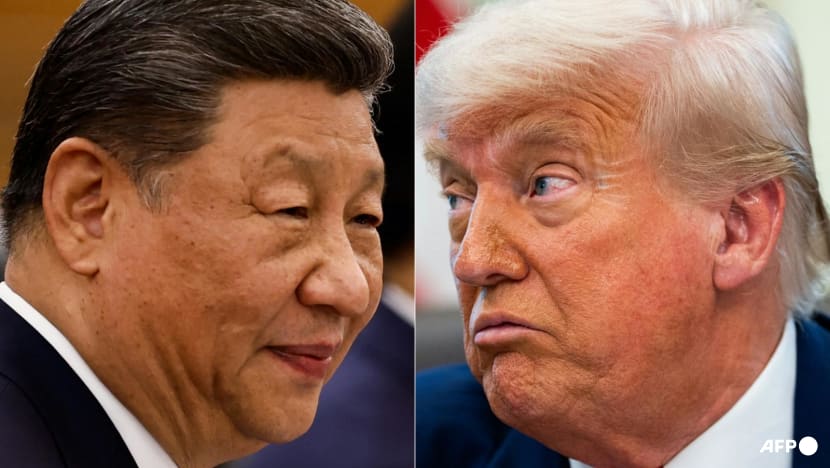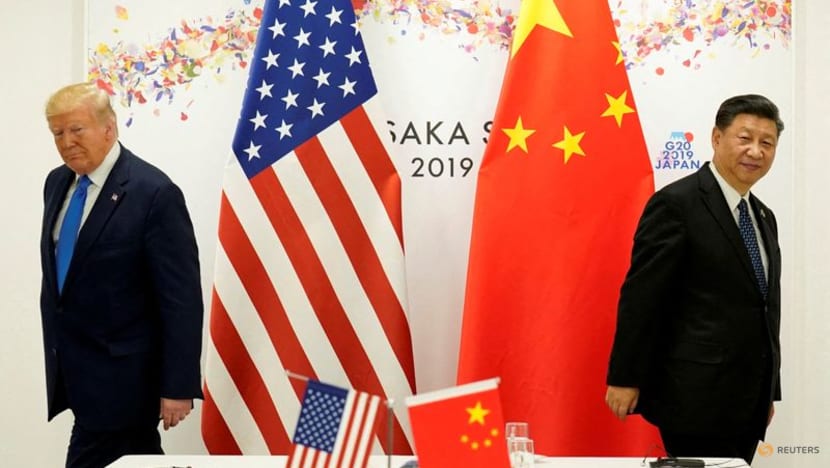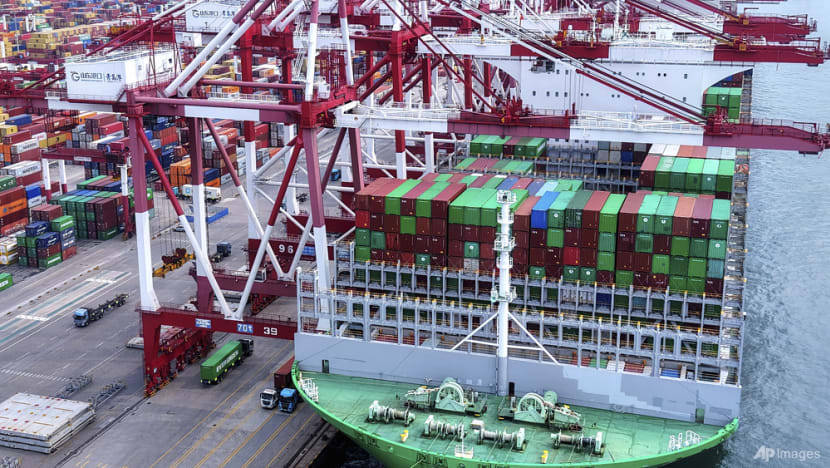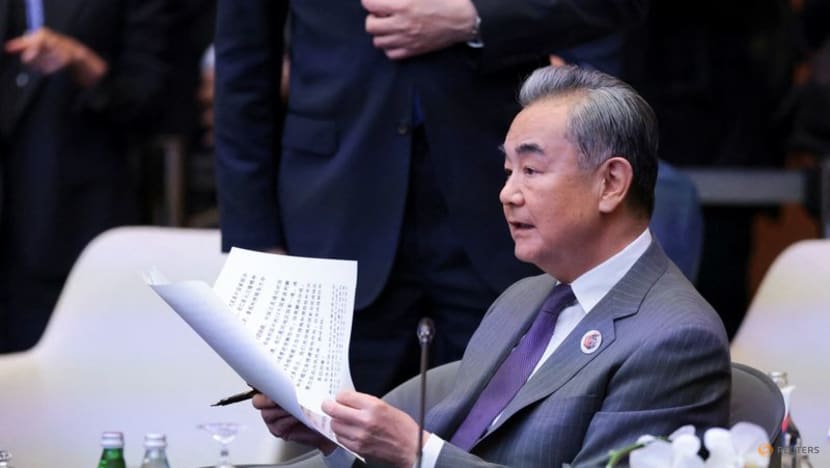analysis Asia
What are the ‘right conditions’ for Xi to make rare appearance at ASEAN Summit?
Malaysian Prime Minister Anwar Ibrahim said last week that he “believed” Chinese President Xi Jinping would join the Oct 26 to 28 meetings in Kuala Lumpur, though Chinese authorities have yet to confirm his participation.

A montage of Chinese President Xi Jinping (left) at the Great Hall of the People in Beijing on May 13, 2025 and US President Donald Trump (right) in the Oval Office of the White House in Washington, DC, on May 30, 2025. (Photos: AFP)

This audio is generated by an AI tool.
KUALA LUMPUR/BEIJING: A potential meeting with United States President Donald Trump, a desire to signal further the importance of the Association of Southeast Asian Nations (ASEAN) to China, and a keenness to advance regional trade pacts amid global tariff tensions.
These are several reasons why Chinese President Xi Jinping might make a rare appearance at the upcoming ASEAN Summit and attend its related meetings, said analysts.
They were commenting on remarks made by Malaysian Prime Minister Anwar Ibrahim last Friday (Aug 8) that he “believed” Xi would join the Oct 26 to 28 meetings in Kuala Lumpur, though Chinese authorities have yet to confirm his participation.
If confirmed, Xi’s participation would break China’s longstanding practice of sending its premier to ASEAN-related summits.
The last time a Chinese president attended an ASEAN-related summit in person was in 1997, when Jiang Zemin joined the inaugural ASEAN-China meeting. Xi’s most recent involvement was virtual, when he chaired a special ASEAN-China summit in 2021 marking 30 years of dialogue relations.
Analysts said a change in protocol would reinforce China’s message of goodwill to the region while signalling its intent to play a more visible role in shaping the bloc’s agenda.
Washington, meanwhile, has already confirmed that Trump will attend, in what would be his first ASEAN Summit appearance since 2017.
Anwar said Trump had accepted the invitation in a phone call in late July, adding that the Malaysian chairmanship aims to make the gathering “the largest and most high-profile” in the bloc’s history.
Ilango Karuppannan, a former Malaysia ambassador with more than three decades of experience in the foreign service, said that if Xi were to attend the ASEAN Summit, it would signal that Beijing sees value in the visit beyond the summit agenda.
“For ASEAN and Malaysia, it would be a diplomatic win - even more so if President Trump is also here,” he told CNA.
“It would underscore ASEAN’s centrality and Malaysia’s convening power, and create at least a symbolic opportunity for US-China leader-level engagement.”
CONDUCIVE ENVIRONMENT
As ASEAN’s rotating chair, Malaysia needs to create a conducive environment for Xi to attend the regional bloc’s summit in October, said analysts.
This includes setting up a possible meeting with Trump and ASEAN leaders to address mutual concerns about trade, and ensuring ceremonial, logistics and protocol considerations are in order.
“Xi’s attendance would depend on Malaysia creating the right conditions for Trump and Xi to meet,” said Sharon Seah, a senior fellow at Singapore think tank ISEAS-Yusof Ishak Institute.
For Trump, it would be “creating a perception of making gains for his visit to ASEAN”, she said.
“Perhaps it might be to organise an ASEAN-PRC-US leaders meeting to hash out what Trump perceives as a ‘Southeast Asian backdoor’ for PRC goods exported to the US,” she said, using the acronym for the People’s Republic of China.
“For Xi, I think it will be harder to convince him to come unless the US side signals strongly the willingness to talk bilaterally,” said Seah.
For Xi to make a rare appearance at the summit, Beijing would also need to consider the regional climate and its domestic economy, and make a deliberate choice of putting greater political weight on ASEAN engagement, experts said.
This would come in recognition of Southeast Asia’s growing importance in the strategic calculations of both powers, even as the two leaders have more chances to meet at other global summits later this year, they added.

The US and China on Monday announced a 90-day extension of their tariff truce, staving off steep triple-digit duties that had threatened to all but freeze bilateral trade.
The move is the latest in a series of de-escalatory steps between the two powers and comes just months before both leaders are expected to meet.
It also reinforces expectations that Southeast Asia - and potentially the ASEAN Summit in Malaysia - could serve as a venue for renewed high-level engagement.
The tariff reprieve buys time for broader trade negotiations, progress on which could help set the stage for any high-profile encounter in the months ahead.
Still, the extended pause leaves open where and when such a meeting might occur. Other possibilities include a potential Trump visit to China or the APEC Leaders’ Meeting in South Korea in November, observers said.
Zhao Minghao, a professor and deputy director at Fudan University’s Center for American Studies, argued that Xi opting for an in-person appearance would “indicate China's efforts to actively promote deeper integration with countries in its neighbourhood”.
He highlighted the “global” nature of US-China rivalry and the importance of “third parties”, with Southeast Asia now factoring into discussions of a possible “grand encirclement” strategy floated by US Treasury Secretary Scott Bessent.
Such a US-led coalition, Zhao explained, could aim to curb Chinese economic influence through measures like high tariffs on trans-shipments and tighter scrutiny of Chinese investment in countries such as Vietnam, Thailand and Malaysia.
Xi’s attendance would “signal renewed engagement between China and ASEAN, especially in light of the new tariff order, and give fresh momentum to talks on upgrading the ACFTA as well as advancing RCEP,” said Asrul Hadi Abdullah Sani, a partner at strategic advisory firm ADA Southeast Asia.
ASEAN and China are expected to sign an upgraded ASEAN-China Free Trade Area (ACFTA) deal at the summit in October, while the bloc has also identified the Regional Comprehensive Economic Partnership (RCEP) as one way of diversifying trade partners.
The ASEAN-driven RCEP comprises the bloc’s 10 members as well as Australia, China, Japan, South Korea and New Zealand. It is the world’s largest free trade agreement, comprising around 30 per cent of the world’s total gross domestic product and population.
“(Xi’s) decision will depend on timing, priorities, and the regional climate closer to October,” said Ilango.

Some analysts also noted that Xi had only recently visited Southeast Asian states - Vietnam, Cambodia, and Malaysia - in April this year, making a second visit to the region so soon an unlikely prospect.
Ren Xiao, a professor at the Institute of International Studies, Fudan University, noted that Beijing traditionally sends the premier to the ASEAN-China Summit, describing it as an “established practice” with “no particular reason to change this tradition”.
For instance, Premier Li Qiang participated in the inaugural ASEAN-Gulf Cooperation Council (GCC)-China Summit in May. He also attended the East Asia Summit held on the sidelines of the ASEAN Summit in Vientiane, Laos, last October.
If Xi were to attend instead of or alongside the premier, “that would indeed be an elevation in status and a sign of greater importance attached to the meeting”.
“But whether this will happen still depends on official confirmation,” he said.
ASEAN A NEUTRAL GROUND TO MEET – BUT OTHER WINDOWS EXIST
If Xi does attend the ASEAN Summit, experts believe a bilateral meeting with Trump would be on the cards and would be highly anticipated amid strained Sino-US ties over trade, technology and security.
The most recent in-person meeting between Xi and Trump took place in Osaka in 2019 during the G20 Summit. The last time Xi met a sitting US president in person was in November 2024, when he met then-US President Joe Biden at the APEC Summit in Peru.
“Let’s face it – ASEAN is important, not for the summit itself, but for the fact that ASEAN provides a neutral ground for both sides to meet. The rest of the world would like to see a Xi-Trump meeting materialise,” Seah said.
“Whatever the excuse may be, if such a meeting can be orchestrated at the ASEAN Summit, better still because this is a consequential meeting that would set the tone and direction of Sino-US relations for the next three years,” she said.
“It has serious implications on global trade, rule of law, peace and security for different regions in the world.”
There have been “some positive signs of US-China policy from Beijing’s perspective” in recent weeks, said Zhao.
This includes US Treasury Secretary Bessent’s assurance that Washington does not seek decoupling, and US Secretary of State Marco Rubio’s remarks that ties are entering “a stage of strategic stability” following talks with Chinese Foreign Minister Wang Yi.
“There are still opportunities to recalibrate US-China relations and reach modus vivendi for competitive co-existence during Trump’s second term,” Zhao said, using the Latin phrase for an arrangement that allows two sides to co-exist despite their differences.

However, Ilango noted that the summit’s agenda is already “extremely packed”.
“Ceremonial, logistics, and protocol considerations will also factor into leaders’ decisions,” said Ilango, who now hosts a YouTube series on foreign diplomacy.
The possibility of a Xi-Trump meeting is “still highly speculative”, he added.
Even an informal meeting between them would need to be carefully pre-arranged by both governments, Ilango said.
“The likelihood will depend on US-China relations in the lead-up to the summit, whether there’s a mutually beneficial agenda, and how such a meeting could fit into what will already be a tightly choreographed programme with numerous ceremonial and protocol demands.”
Even if Xi and Trump do not meet in Malaysia, they will definitely meet in the second half of this year, said Ren. They could meet at the APEC Leaders’ Meeting in South Korea in November, he said.
There is also a short gap between the ASEAN Summit in October and the APEC Leaders’ Meeting in South Korea that could serve as an alternative window for arranging a Trump visit to China.
“It is only early-to-mid August now, so it is still relatively early, and I believe no diplomatic decision has yet been made,” said Ren.
REAL MEASURE OF SUCCESS
If Anwar does score a coup, it would strengthen his claim to “pragmatic, non-aligned statecraft and showcase Kuala Lumpur’s ability to bring competing powers together”, said Ilango.
Anwar also said he received “positive indications” about the attendance of Brazilian President Luiz Inácio Lula da Silva and South African President Cyril Ramaphosa. Both countries are among ASEAN’s sectoral dialogue partners.
If Anwar successfully gets the four world leaders to the Summit as he indicated, his legacy as the "most influential ASEAN chair" would be sealed, said Seah.
“As for Malaysia, it could be a legacy moment, allowing the country to cement its position in regional diplomacy,” Asrul Hadi said.
But even with such a feather in their caps, the “greater test” is to ensure the presence of Xi and Trump “yields results of lasting value”, Anwar said during the 58th Asean Day celebration at the Cyber Event Hall on Aug 8.
“The real measure of success will be keeping the optics balanced, managing the heavy ceremonial and logistical demands, and still delivering tangible ASEAN outcomes,” Ilango agreed.
Observers were cautiously optimistic in their expectations of what a Xi-Trump meeting will achieve.
“The meeting is unlikely to yield a significant breakthrough, though it may offer a temporary cooling of trade tensions, a development that would benefit ASEAN. In the end, Trump remains a hard negotiator and will press for a deal on his terms,” said Asrul Hadi.
Xi’s attendance would help facilitate mediation and promote dialogue between Cambodia and Thailand, Ren said, referring to the recent deadly eruption of border tensions between the two neighbours that has de-escalated to a ceasefire since Jul 29.
“China is not necessarily focused on competing for influence in ASEAN. As long as China adheres to the principles of its neighbourhood diplomacy and does its own work well, that will suffice,” Ren said.






















